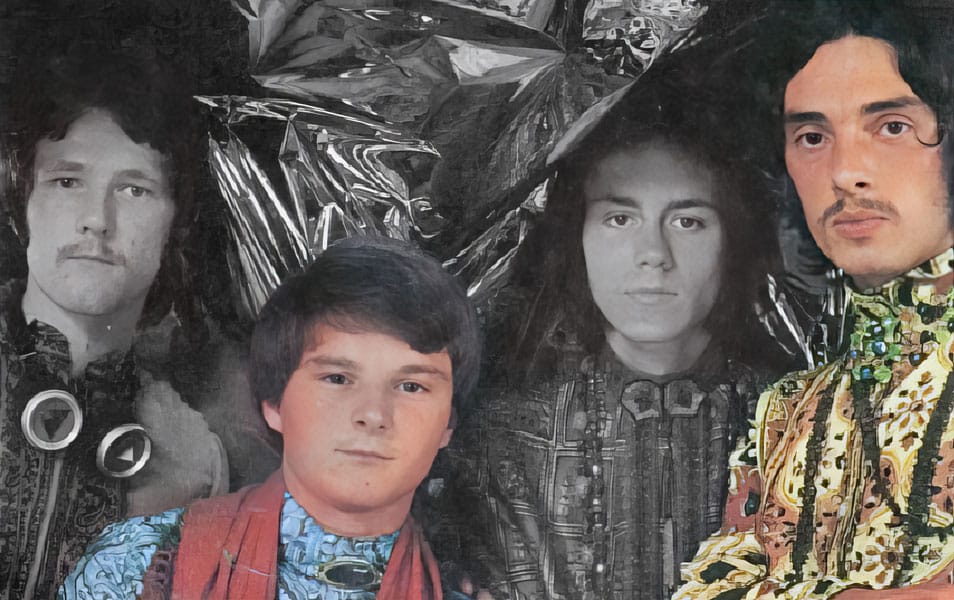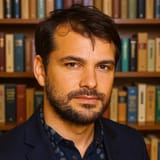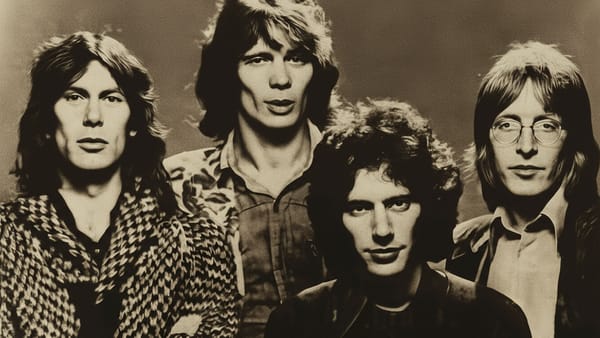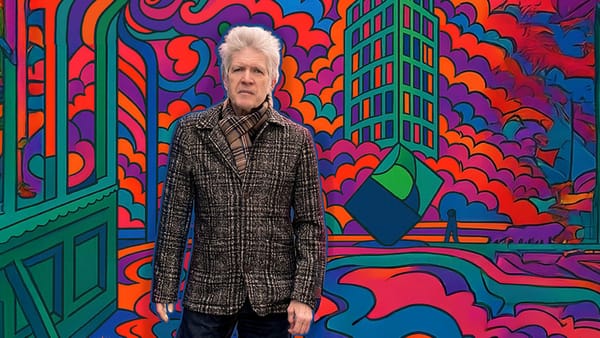Diving Into Yesterday: Peter Daltrey & Danny Bridgman Reveal Kaleidoscope & Fairfield Parlour's Captivating Story

On March 19th, Think Like A Key Music/Beyond Before unveils Sky Children: The Best of Kaleidoscope & Fairfield Parlour – the first-ever compilation, at least in North America, celebrating the British band's entire career from 1967 to 1971. This release includes a DVD featuring rare TV recordings, such as the never-aired Beat Club performance.
Preserving the band's history is a testament to the tireless efforts of leader Peter Daltrey. In an exclusive interview, Think Like A Key speaks with Peter and drummer Danny Bridgman about the new compilation, reminiscing on their journey and exploring their lasting legacy.
PETER DALTREY interview

TLAK: It’s strange but true that none of the Kaleidoscope or Fairfield Parlour albums received a release in the United States. The closest thing was the "Bordeaux Rosé" single in 1970; however, it may appear that only promotional copies were pressed by RCA. You mentioned to me that the band wasn’t even aware that happened. Were there ever any talk or aspirations to work and tour in the United States?
Peter Daltrey: I must emphasise yet again that we had a lousy record company. Dick Leahy, our young producer, loved the band. We heard that he was telling anyone who would listen that he was convinced he`d found `the new Beatles` – not unusual in the Sixties. Every producer and record label were hoping to find the same. But above Dick was a hierarchy of managers and directors who had other goals: money. And lots of it. Music was secondary to their search for the next `big thing` that would swell their coffers and keep their shareholders happy.
Our contact with Fontana was Dick Leahy. Almost exclusively. We did bump into his immediate boss at promotional shindigs etc., but he made it very obvious that we were not even good enough to shine the shoes of his own recording stars, Dave Dee Dozy Beaky Mick and Tich, a group that had made him and the label lots of dough with their string of pop hits. We wanted their success but not at any price. We wanted to do it on our terms, not pander completely to commerciality. But eventually pressure from above got to Leahy and we succumbed to pop temptation with the radio-friendly, “Jenny Artichoke.”
We were told virtually nothing about Fontana's plans for us in the US. And that early stage I doubt anyone was brave enough to suggest promoting us in the States as we were struggling to make our mark in the UK. After we had somewhat foolishly re-signed with Philips/Fontana on their new progressive label, Vertigo, the management had stayed the same. We now had a manager / producer, David Symonds to fight our corner, but even he was frustrated by the old school workings of the label bosses. And I'm not sure even he was told that "Bordeaux Rose" was planned for a single release in the US; but I could be wrong. The fact that it appears to have only been a promotional pressing would indicate that they were testing the waters, sending it out to radio stations for feedback before an official release. It would have made sense to have coordinated that effort by telling us and sending us over for interviews and two or three spearheading gigs, if only to industry honchos.
Of course, I got the last laugh touring successfully in California in 2011 and through several states from the west coast to Las Vegas and on to the Austin Psych Fest in 2013.
TLAK: One of the real highlights of this new set is the release for the first time of the unbroadcasted session for the now legendary German TV music show Beat Club. Was there ever a reason given for it being shelved? Admittedly, the session itself is a little odd for the time as most acts were performing live on it and Fairfield Parlour appear lip-synching, and without the proper instruments in some cases. Was there a discussion whether to do it live or perform to the track?
PD: After my previous answer it will come as no surprise the learn that we were told virtually nothing about what was planned for the Beat Club appearance. We were told to bring just the guitars. Ed had an old guitar that I don`t think he ever played on stage as it was always out of tune. So my brother painted it with the flowers just for the Tangerine Dream cover shoot. You can see Ed 'playing'`' it on the Beat Club show so I doubt a live appearance was ever on the cards. Our manager pulled off the booking, obviously pleased to have secured us a slot on this top German TV music show. We were all having a damn good laugh from the start. We arrived late at Heathrow and missed our flight. We couldn't arrive late for the filming so jumped on a flight to Dusseldorf and then hopped on a tiny twenty-five-seater for a scary hop to Bremen, arriving with no time to spare.
Unlike the French TV appearance featured on the new release, where the Paris studio was chaotic with crazy producers and staff running around flapping and panicking and no-one seeming to be in charge, I remember the Beat Club studio as virtually deserted. It turned out we were not late and they weren't ready for us so we decamped to the studio canteen around 1pm. We were left stewing and bored until 8pm. By this time most of the staff had buggered off. We were told to just stand in the studio which was also empty apart from a few speaker cabinets and a drum set. It was explained to us that they would mix our footage in with some clever state-of-the-art imagery. So, we just stood there in the clothes we'd arrived in not really knowing what was happening, but still in something of a party mood. We weren't playing live so there was no pressure. Miming was a piece of cake. Let's enjoy it. You can see on the footage of "I Remember Sunnyside Circus" that we can barely contain ourselves. Ed and Steve had worked out a swap places dance routine and you can see me doubled over laughing. We finished filming at midnight, had a meal, crashed at a hotel, arrived back in London the following morning. Dave had lost his coat and Steve was stopped for questioning as a customs official thought he'd bought his new bass in Germany and had his hand out for some hefty import duty. We had a gig booked for that night, but to everyone's relief it had been cancelled.
And we had no idea the footage had never been used. Typical Kaleidoscope / Fairfield Parlour luck...
TLAK: What memories does watching this footage, almost 50 years later, give you?
PD: Oh, it brought a lump to my throat...particularly seeing Steve enjoying himself. He was a great character. He was always positive, easy-going. Fun to be around. Always managed to lighten the mood when Dan and I were down and moaning about our lack of progress or problems with the van or gigs that hadn't gone well. Steve loved his food and as long as we were within a five-minute drive of a chip shop he was happy. He was as focused as all of us on our quest for success, but he didn't allow the ups and downs to eat away at him or get him over excited like the rest of us did. Steve was just good old dependable Steve. What you see is what you got. Look at him busy tucking in his shirt when he's supposed to be focusing on performing. And he checks out where the camera is with a nervous glance, fiddling with his flute: “What do I do with this...?!” when he'd finished his part, quickly passing it to me. And I was surprised to see how animated he is playing his bass, slapping away there. I forgot how confident a player he was.
And, of course, having only recently lost Ed it was very moving seeing him in this old footage. Again, so good to see that we all enjoyed ourselves some of the time as well as enduring all the trials and tribulations of our troubled career. Ed and I have a lot of history having written and created all the band's material. That is a lasting bond.
And there's Dan, head down getting on with business like he always does. When he joined me on stage back in 2013 and 2017 I would look round during a song and there he was: head down, hammering away, just doing what he does best. The guy's energy levels are awe-inspiring.
And then there`s my twenty-four year old self, trying just a bit too hard to perform. Clearly slightly nervous, as self-conscious as ever. Like most performers I don`t enjoy watching myself trying to do it...
TLAK: Several things were hunted down during the research for this release, including a promotional film shot for “A Dream For Julie”. That one lead absolutely nowhere except for your confirmation that it did indeed happen. There was mention of TV cameras rolling when Kaleidoscope played in Montreux 1968 and also a Dutch radio broadcast from the Paradiso Club in support of Country Joe & The Fish. Unfortunately, while the Fish set exists for posterity, the Kaleidoscope portion doesn’t. Could you tell us more about these? Did the band ever record live performances for their own archive?
PD: Now there's yet another indication of record company stupidity and incompetence. Why would they go to all the trouble and expense of making a promotional film for "A Dream for Julie" – clearly expecting that they had a potential hit on their hands – and then not use it? It was an unusual expense at the time. I know I was shocked and dismayed way back then at their ineptitude, but half a century on it still gets under my skin. I wish I could get hold of those damn fools by the neck and shake them: What the hell were you thinking, you idiots...?
No idea on the Montreux footage, but it was a big media festival so would definitely have been filmed.

After our Amsterdam concert hall appearance supporting Country Joe – a disaster for us due to terrible acoustics in the vast hall – we were booked into the Paradiso club in Rotterdam the following night. But the rider for the night had included a request for unspecified drinks. We found a crate of vodka in our dressing room... The resulting gig was a discordant disheveled mess – all caught on tape. When we arrived back in Britain we were summoned to the Fontana offices and given a roasting by Dick Leahy who accused us – quite rightly – of unprofessionalism. But it was like being treated like a bunch of naughty schoolboys. Not quite the relationship a band wants with its record label. As remarkable as it seems, we were still a bunch of immature kids. Nowadays young people in their twenties are often confident, worldly and experienced. We were not. Just four mates obsessed with our music and trying to succeed, naively unaware of the machinations of big business or how to conduct ourselves to impress and stay out of trouble.
Recording a live performance ourselves back then would have been pointless without a state-of-the-art set up. We were always broke so had no pot of money to splash out on such exercises. And you would need a label to release the resulting recording. I don`t think live albums were as popular then as they are now.
I do have recordings off the desk from a handful of my own late shows. One in particular from Leon is good enough to be released and features all Kaleidoscope and Fairfield Parlour material. I did start out wanting to incorporate a few of my solo songs in the set, but that idea soon got shelved when it became obvious that the fans wanted band back catalogue exclusively. I`m fine with that. I just love playing those old songs.
TLAK: It's probably for the best that the Paradiso recording didn’t turn up then! Speaking of live performances, could you tell us a typical Kaleidoscope live set from the early days vs. a typical later day Fairfield Parlour gig? Were songs from the unreleased at the time White Faced Lady album performed live?
PD: I have a terrible memory. These answers to your questions are only possible because I have my scrapbooks beside me for research into that misty past. No set lists have survived, but obviously the Fairfield Parlour set list would have included songs from our album and singles, but did include a few of our own favourite Kaleidoscope songs. As to White Faced Lady – as I recall we once rehearsed "Song from Jon" during a soundcheck at Queens University in Belfast on 22th November 1970 but I think I'm right in saying we did not play it that night. And never played any of the other songs live. Our career was heading for the pan at this point so gigs were sparse.
When I returned to live performances in 2011 my set list comprised of all my favourite songs from our back catalogue, including one or two from White Faced Lady. I do remember we were rehearsing the title track in a studio in LA and I broke down having suddenly realised that it was the first time I had sung that song after recording it back in Chelsea forty-one years earlier.
TLAK: Did you ever imagine that the music created with Eddy, Steve & Dan at the time would still be finding an audience 50 years on? When did the band realize that there was still a considerable interest in the music?
PD: No one thought at that time that in the next millennium The Rolling Stones for instance would still be performing, touring the world and still putting on a stunning live show. Or Bob Dylan at eighty. We never had pretensions of such grandeur and probably didn't think about such things, concentrating as we did working each day for the job at hand: writing good songs.
I think the revival in interest in the band crept in during the eighties when pirate or bootleg reissues started to appear. We were shocked. Not long before that I had been clearing out my desk and found a quarter inch tape reel of around eleven songs we had recorded in a demo studio around `69 or `70 for our publisher. Thinking no one would be interested in that I threw it in the bin. Imagine that... As we now discuss the possibility of a definitive vinyl box set of the band's entire back catalogue, those eleven ultra-rare demos would have made an attractive extra album in the box.
TLAK: It’s well known that the original pressings of all the catalog fetch high prices in the collectors’ market. I’m curious to know if the band received stock from Fontana/Vertigo and if so, did you guys hang on to them?
PD: Ha ha...You probably know my answer to that little gem of a question...! The record company gave us NO albums or singles. We had to buy our own. Now....can you believe that...? And, of course, those high prices – I recently saw an original Tangerine Dream sell for over £2,000.00 – mean nothing to us, other than it just goes to show that they are so rare because virtually none were sold back in the day or that they are much prized by collectors. I wonder if you play a two thousand pound album...
TLAK: There was a musical career gap of over 20 years, between the end of Kaleidoscope/Fairfield Parlour and your first solo record 'Dream On'. Were you writing music at all in between this time? And what inspired the “comeback”?
PD: When we finally released White Faced Lady there was much talk about getting back in the studio. But nothing came of it. I was incredibly frustrated because I dearly wanted to write and record again. But in my collaboration with Ed, I had simply contributed the lyrics. Ed was in charge of the musical composition. So, I had to teach myself to write both lyrics and melody and then find a way of recording the resulting songs. So, I had to learn how to use incredibly complicated music software like Cubase, assemble a home studio then work out how to play all the parts myself. I can play keyboards in a ham-fisted way, but to my eternal regret I never mastered the guitar. But with keyboard synthesizers reproducing every musical instrument you can think of I was able to play the individual parts and build up the final track.
I released my first album, Dream On, on cassette and then on CD in 1995. I've since recorded nineteen albums. One of the joys of this later career has been working with what I call real musicians. I have been very fortunate to write and record with very talented, like-minded young musicians like Damien Youth, Mike Dole, Derek Head, Arjen Lucassen – and, of course, the fab Asteroid #4 boys on our 2012 album, The Journey. One of my personal favourites – along with Tattoo, one of the four albums that Damien Youth and I released.
TLAK: I think the part of the reason Kaleidoscope & Fairfield Parlour catalog stands out among your contemporaries is because there isn’t an attempt to base it on R&B or four-chord rock ‘n’ roll of the mod, garage from the pre-Kaleidoscope bands The Sidekicks / The Key. 1969’s Faintly Blowing hardly jumped the bandwagon of the back-to-basics blues and rock from the likes of trendsetters Fleetwood Mac & The Beatles. Would you agree?
PD: I am inordinately proud of the way my songwriting collaboration with Ed matured over the years. If you look at "What Can I Do" on the CD and compare that with any of the much later material, they are almost unrecognizable as by the same band. There is a steady and measured songwriting progression that runs naturally from Tangerine Dream and Faintly Blowing, into From Home to Home and culminating in songs such as "Freefall" and "Picture with Conversation" on White Faced Lady. When the band finally had to admit defeat and throw in the proverbial wet towel Ed and I had already begun writing the next album – which, of course, never saw the light of day.
Ed and I were big fans of the Kinks and the Troggs but for some reason our songwriting took on a more complicated story-telling style. But I bet Ed would agree that we would have loved to have written "Wild Thing" or "You Really Got Me"…!

TLAK: Finally, I have to ask…what happened to the Daltrey/Pumer songwriting partnership? Did it end when the band ended?
PD: I could give you a one-word answer: yes.
The band had split. We were all married, soon had children and steady jobs. I had escaped from London to the countryside. We didn't lose touch as such, but I doubt we spoke more than a couple of times a year until the revival of our fortunes began. But even then, as I've explained above, although I would have happily worked with Ed again, he had his own sparkling career in radio and eventually with Paul McCartney and I had discovered I could write and record and release my own work.
But we never stopped talking about getting together again. Two songs we had written for that final band album were called “Blue Larry” another “Blue Planet” both much loved by Ed. I can hear him now on the end of the phone: “Oh, Pete...we must get back into the studio, Blue Larry is waiting...!”
Sad but true. Now Dan and I are waving the flag on our own. Still passionate. Still moaning about injustice and lost opportunities. Dan more philosophical about it than I’ve managed. I still have the occasional sleepless night wondering: “What if…?” Dan and I are now missing both Steve and Ed but still championing our little old band. Resigned to our fate...and hoping that someone somewhere will remember us...
DANNY BRIDGMAN interview

TLAK: All of Kaleidoscope / Fairfield Parlour’s material was written by the powerhouse duo of Peter Daltrey and Eddy Pumer. How would they introduce the songs to you and Steve Clark? Were there ever times in which either Steve or yourself vetoed material?
Danny Bridgman: Pete would give the words to Ed who would then add the beautiful music. We would then meet up in the room of percussion to listen and learn them completely. We discussed every aspect. Rehearsed them until we were ready to record them. I don't think we ever vetoed any song, just made sure everything was good to go.
TLAK: The arrangements really worked as a band, how instrumental (no pun intended) were you guys, as the rhythm section, to the final versions of the songs? How was the typical process in the recording studio for the sessions? Would the drums be recorded alongside guitar and bass, or was it more piecemeal?
DB: Instrumentation was a huge part of the arrangements until everything was perfect to go. Drums, rhythm guitar, bass and guide vocal would go down first then built up till finished.
TLAK: The four of you were together since the early sixties, with only the band names changing. However, in the summer of 1970, when Fairfield Parlour’s “Just Another Day” EP appeared, it featured Moody Blues drummer Graeme Edge playing on the title track! Could you tell us the story of how this ended up happening?
DB: I was in hospital when the guys recorded this, paralyzed from the waist down. We did an amazing gig at a place called Mothers just outside of Birmingham [and after the show my] blood vessels in my spine broke, killing off my spinal cord. It took two years of physio to get going again and still to this day I don't have much feeling in my legs and I still need sticks to walk.
TLAK: The real highlight of this new compilation is the DVD material, which features two surviving TV recordings of Kaleidoscope and Fairfield Parlour. The French TV appearance shows the band hanging out with the likes of France Gall and Serge Gainsbourg during the program. What are your memories from that experience? Were you guys fans of the other artists on the show?
DB: We didn't know the artists well at all except Mr. Gainsbourg, but they were all extremely nice and helped us do our bit.
TLAK: The Beat Club footage never aired originally and until this release, had never been seen. Admittedly, the session itself is a little odd for the time as most acts were performing live on it and Fairfield Parlour appear lip-synching, and without the proper instruments in some cases. Your drum kit is there, however. What do you remember from that experience?
DB: I don't remember a lot about this at all. We got there and hung about a lot…did our bit and we're on our way home. I had terrible trouble at the depart lounge, ah, but that's another story!
TLAK: When the band essentially stopped after the fate of the White Faced Lady album was sealed, did you move on to play with other musicians/bands? How did the band handle the break up?
DB: I devastated when we had to stop. When the band finished, I went to see a guy called Geoff Emerick at Apple Studios. He was great and gave me the job as second sound engineer. Some of the people I worked with include George and Ringo and their crew on “Back Off Boogaloo” - my first hit record! Marc Bolan, Linda Lewis, Tim Hardin, Harry Nilsson, the great band Badfinger, Jerry Lieber & Mike Stoller with Stealers Wheel… “Stuck In The Middle With You” by Gerry Rafferty and Joe Dolan. Spent 6 weeks doing that album. Mike Bat…brilliant muso wrote loads of hits for huge stars. Quite a few other groups would come just to day they recorded at Apple Studios. I did a few sessions with Geoff Emerick…fabulous. I played on a few tracks for various groups, the best one being top German group Eulenspygel album Ausschus…even got rated on the album credits. I did loads of radio commercials to earn some money. Then I bought a record shop in South Kensington and had that for 11 years. Sold it. Had a few crap jobs after to earn a living and then retired happily, I must say.
TLAK: Did you ever imagine that the music created with Peter, Eddy, & Steve at the time would still be finding an audience 50 years on? When did you realize that there was still a considerable interest in the music?
DB: I just feel proud that so many people are still interested. Lots of younger people talk to me on YouTube, really nice.
TLAK: On the DVD, there is video of the final Kaleidoscope performance in London, 2017, where you join Peter and the band on the drums once again for a rousing performance of the classic track “Music”. Were you nervous about doing the show? How much preparation was there for the gig?
DB: No, I don't get nerves. I just love playing live…great feeling…no real preparation really. I just turned up, chatted with the guys and went; had a ball! Can't wait till next time, yeah…

TLAK: Are there any moments that really stand out from back in the day? For example, what was it like to open up the now legendary Isle of Wight Festival in 1970? Do you recall what songs were performed?
DB: Isle of Wight Festival…words can't explain that sea of people, wow! Many different songs to what we recorded. A lot heavier too.
TLAK: Lastly, do you have any favorite songs from the bands catalog?
DB: Favourite songs? Well not many I don't really like. Most favourite is “Dear Nellie Goodrich”…love it! “Snapdragon”, “Diary Song”, “Faintly Blowing”, “Freefall”…love them all but these stand out too me.





